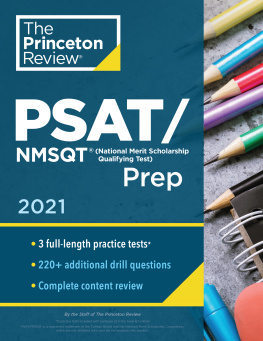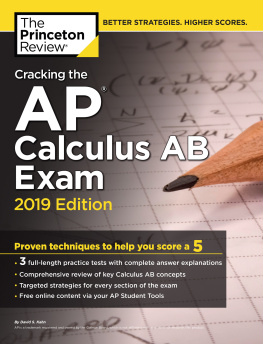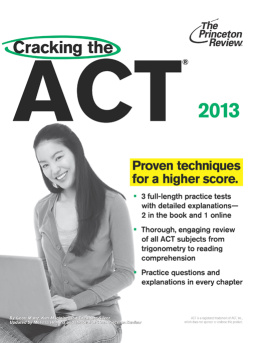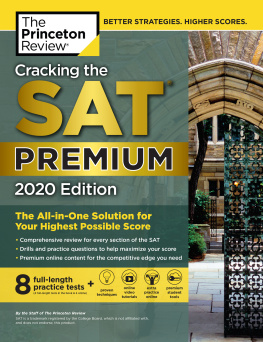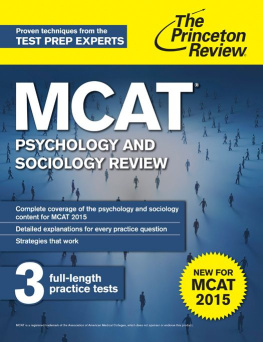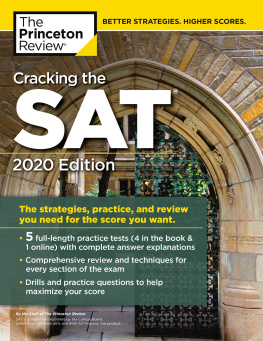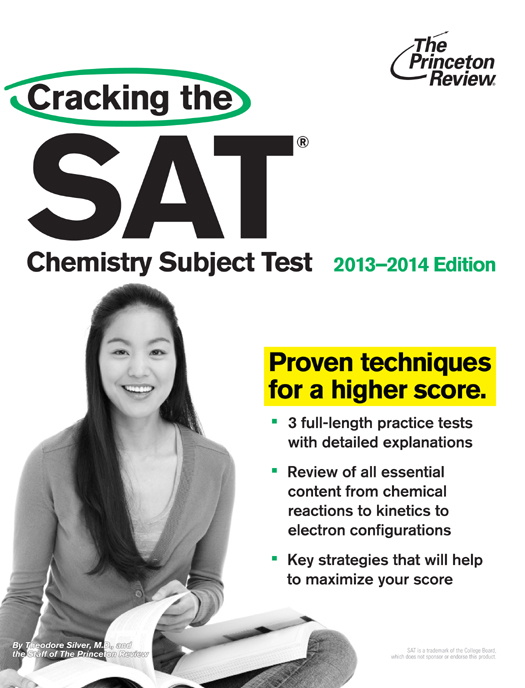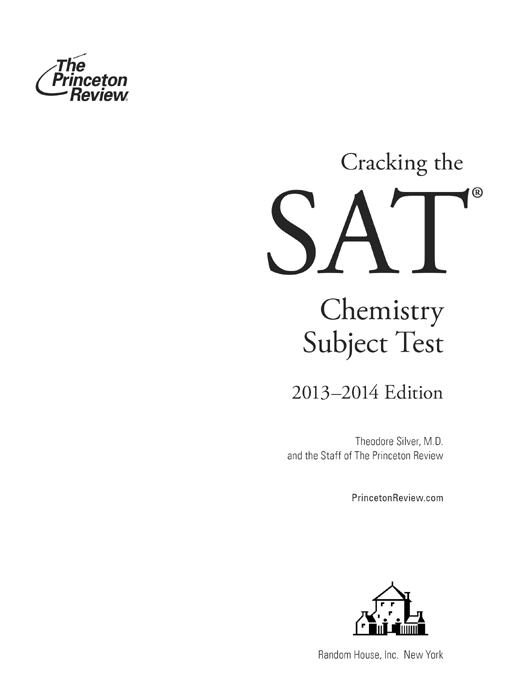
Editorial
Rob Franek, Senior VP, Publisher
Mary Beth Garrick, Director of Production
Selena Coppock, Senior Editor
Calvin Cato, Editor
Kristen OToole, Editor
Meave Shelton, Editor
Random House Publishing Team
Tom Russell, Publisher
Nicole Benhabib, Publishing Director
Ellen L. Reed, Production Manager
Alison Stoltzfus, Managing Editor
The Princeton Review, Inc.
111 Speen Street, Suite 550
Framingham, MA 01701
E-mail:
Copyright 2013 by TPR Education IP Holdings, LLC.
Cover art Jonathan Pozniak
All rights reserved under International and Pan-American Copyright Conventions. Published in the United States by Random House, Inc., New York, and simultaneously in Canada by Random House of Canada Limited, Toronto.
SAT is a registered trademark of the College Board.
The Princeton Review is not affiliated with Princeton University.
eBook ISBN: 978-0-307-94576-1
Trade Paperback ISBN: 978-0-307-94556-3
Editor: Calvin S. Cato
Production Editor: Harmony Quiroz
Production Artist: John E. Stecyk
20132014 Edition
v3.1
Acknowledgments
The author thanks Cary West, John Bergdahl, Greta Blau, Cynthia Brantley, Sarah Brockett, Jessica Brockington, Joseph Cavallaro, Ji Sun Chang, Andrew Dunn, Leland Elliott, Alicia Ernst, Kristin Fayne-Mulroy, Paul Foglino, Effie Hadjiioannou, Julian Ham, Adam Hurwitz, Sung (Peter) Jung, Sara Kane, Jason Kantor, Chris Kensler, Martha Link, Illeny Maaza, Kim Magloire, Robert McCormack, Russell Murray, Jeff Nichols, John C. Pak, Dinica Quesada, Lisa M. Ruyter, Chris Short-Hair Scott, Ramsey Silberberg, Linda Tarleton, Chris Thomas, Thane Thomsen, Chris Volpe, and P. J. Waters.
Thanks to Kathleen Rocklein for her review of the 20132014 edition.
Special thanks to Adam Robinson, who conceived of and perfected the Joe Bloggs approach to standardized tests and many of the successful techniques used by The Princeton Review.
Contents
Chapter 1
Introduction
The SAT Subject Tests are one-hour exams that assess a students knowledge of a particular academic subject. Not all colleges require the subject tests, and some subject tests are more appropriate for certain students than for others. The format and content of a given test falls within certain guidelines, and you should prepare accordingly. In this chapter we will answer some basic questions about the SAT Chemistry Subject Test and how you should prepare for it.
WHAT ARE THE SAT SUBJECT TESTS?
The SAT Subject Tests are a series of tests administered by the Educational Testing Service (ETS). Unlike the regular SAT, the SAT Subject Tests are designed to measure knowledge in very specific areas. Many colleges require that you take one or more of these tests in order to qualify for admission; but even at colleges that do not require that you take them, administrators view student performances on the tests as an important factor that contributes to the decision to grant or withhold admission. Additionally, at some schools, a high score on one or more of the tests might enable you to place out of certain required college courses. For example, if you do well on the SAT Chemistry Subject Test, you might be exempt from fulfilling the science requirement at one or more of the schools to which youre applying!
Which SAT Subject Tests Should I Take?
The colleges that do require you to take the SAT Subject Tests will expect you to take two or three of them. In order to find out which tests are required by the colleges to which youre applying, you can ask your guidance counselor, call the admissions office of the colleges, or check in college guidebooks. Alternately, you can visit the College Board website at sat.collegeboard.org and use their college search engine to look up the colleges youre interested in; each school on this search engine has a profile in which this information is provided.
Once you find out which, if any, tests are required, part of your decision making is done. The next step is to find out which of the tests will show your particular strengths. After all, the SAT Subject Tests are given in a variety of subjects: Literature, U.S. History, World History, Biology, Chemistry, Physics, French, German, Spanish, Modern Hebrew, Italian, Latin, Japanese, Korean, Chinese, and English Language Proficiency. You should take the tests on which you think youd score the highest. If youre fluent in Chinese, take the SAT Chinese Test. If, however, youre most comfortable in the world of moles, atoms, and titrations, take the SAT Chemistry Test.
When Are the Tests Offered, and How Do I Register for Them?
The SAT Subject Tests are usually administered in October, November, December, January, May, and June at test centers around the country. Since not all of the tests are offered at each administration, be sure to check the dates and details on the College Board website carefully. Youll want to take the test on a date thats as close as possible to the end of your coursework in the subject. For example, if your chemistry course ends December 21, take the January test. If it ends in May, take the test in May or Junewhichever date falls the soonest after your course has ended.
You can register for these tests either through the College Board website or through regular mail. To register by mail, ask your guidance counselor for the appropriate forms, which youll need to mail in by the date listed on the College Board websitegenerally about five weeks before the test. You can register late, but late registration ends about four weeks prior to the test week and will cost you an additional fee. The costs of registering for an individual SAT Subject Test are $21 for the first test and $10 for any additional test.
Youll need to arrive at the test center pretty earlyby 8:15 A.M. Your first test will begin promptly at 8:30 A.M. , and since each test is an hour long, if you take the maximum of the three tests that youre allowed to take at each sitting, youll be done by 12:30 P.M. If youre taking just one or two tests, you can leave as soon as youve finished.
One final, but important, noteETS allows you to change your mind about what test youd like to take on the test day. This means that if you arent sure which test youll feel more confident taking, you can study up until test day and then make your decision at the last moment.
How Is the Test Scored, and What Does the Score Mean?
As with the regular SAT, the SAT Subject Tests are scored on a scale from 200 to 800, where 200 is the lowest and 800 is the highest; the exception to this rule is the English Language Proficiency Test, which is scored on a scale from 901 to 999.
Subject tests that do not involve written responses (such as the SAT Chemistry) are graded by a computer. The computer simply adds up the number of questions you answered correctly and subtracts from this number one-quarter of the number of questions you answered incorrectly. (It doesnt count questions that you skipped either way.) This determines your raw test score. The raw score is then converted to a scaled score.


